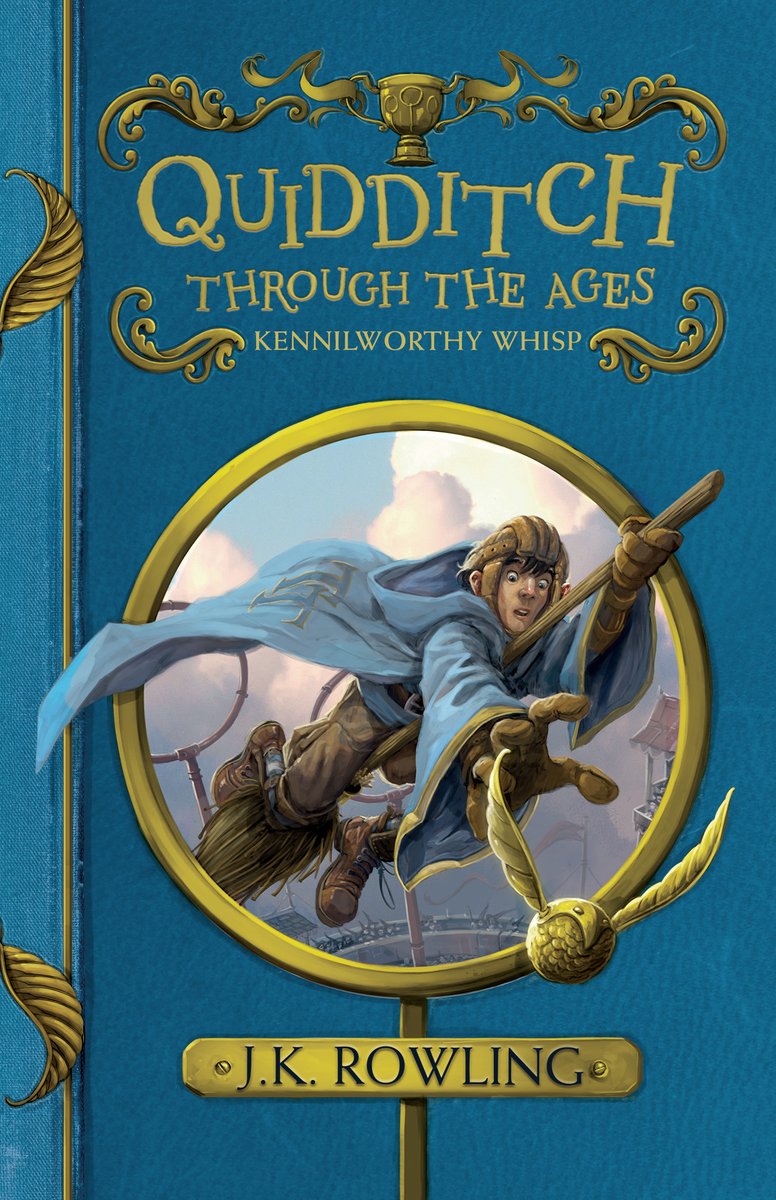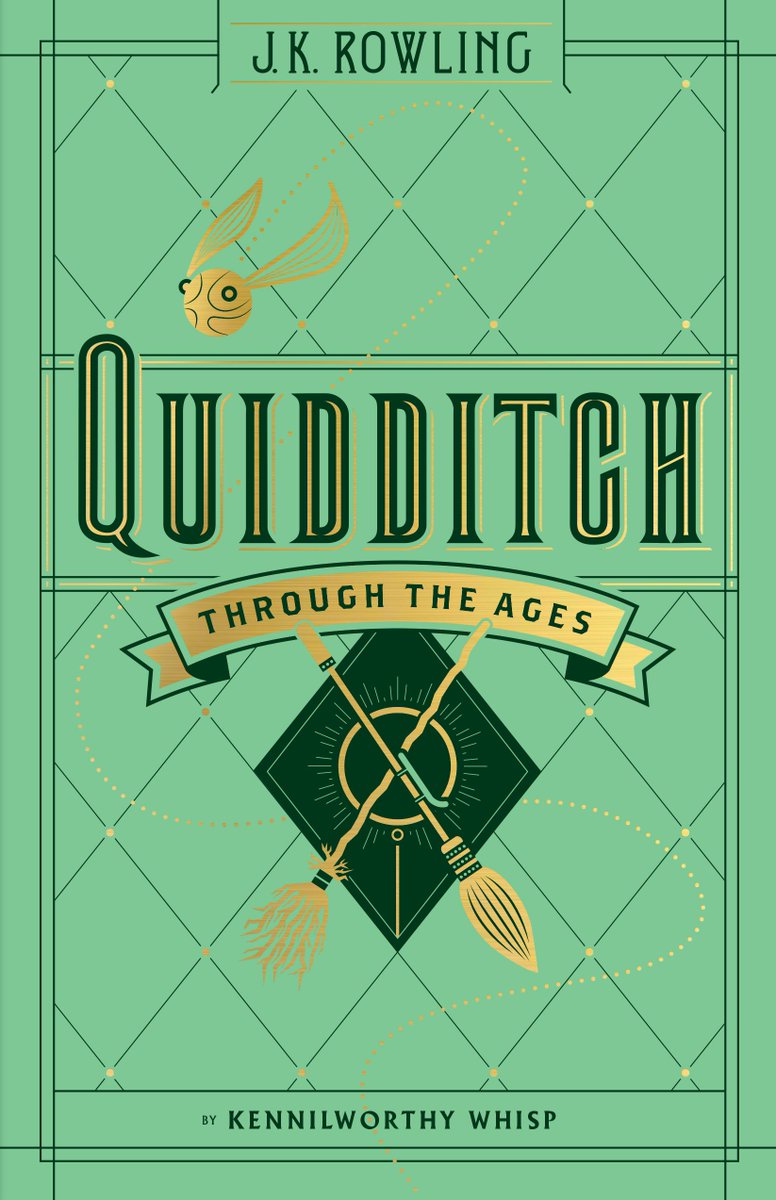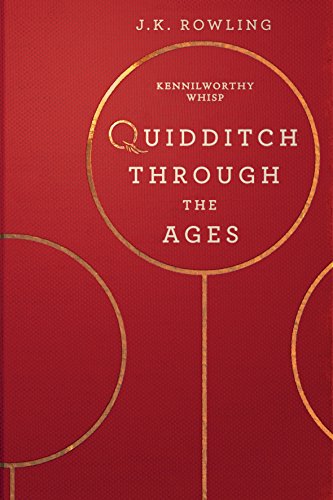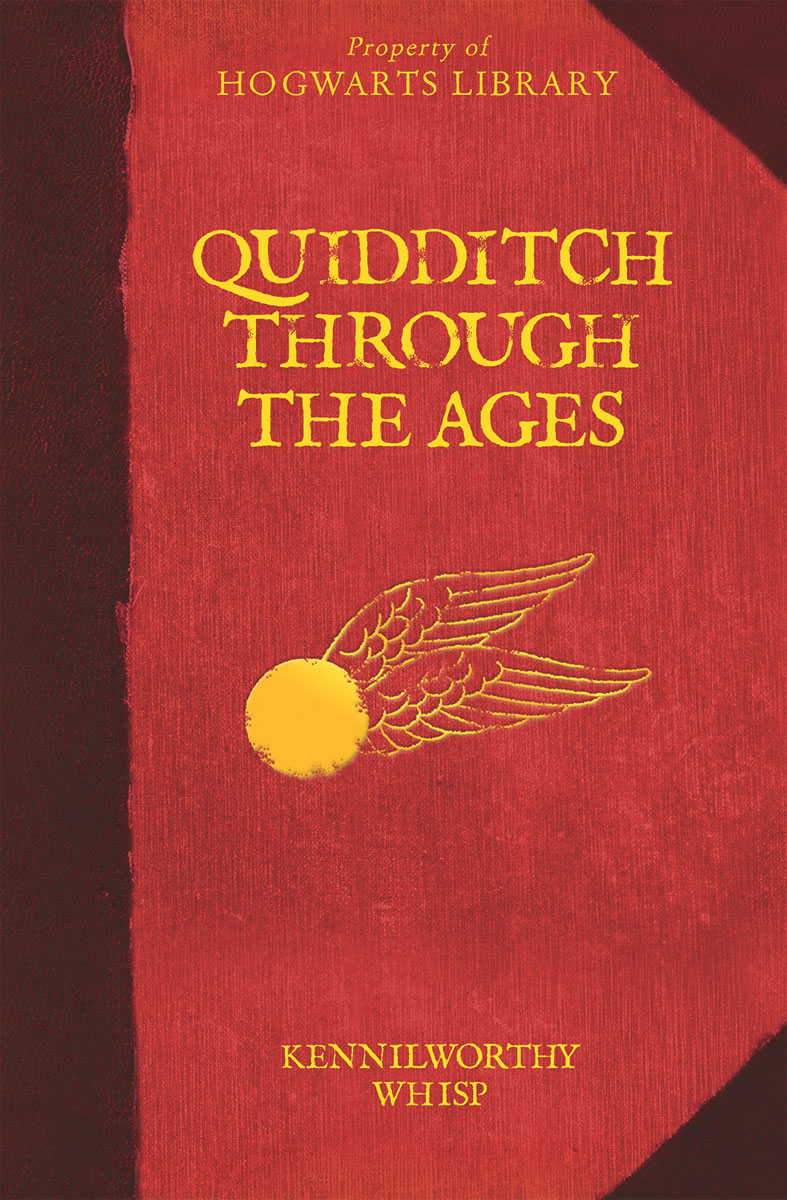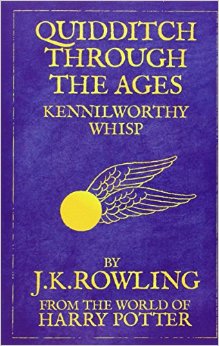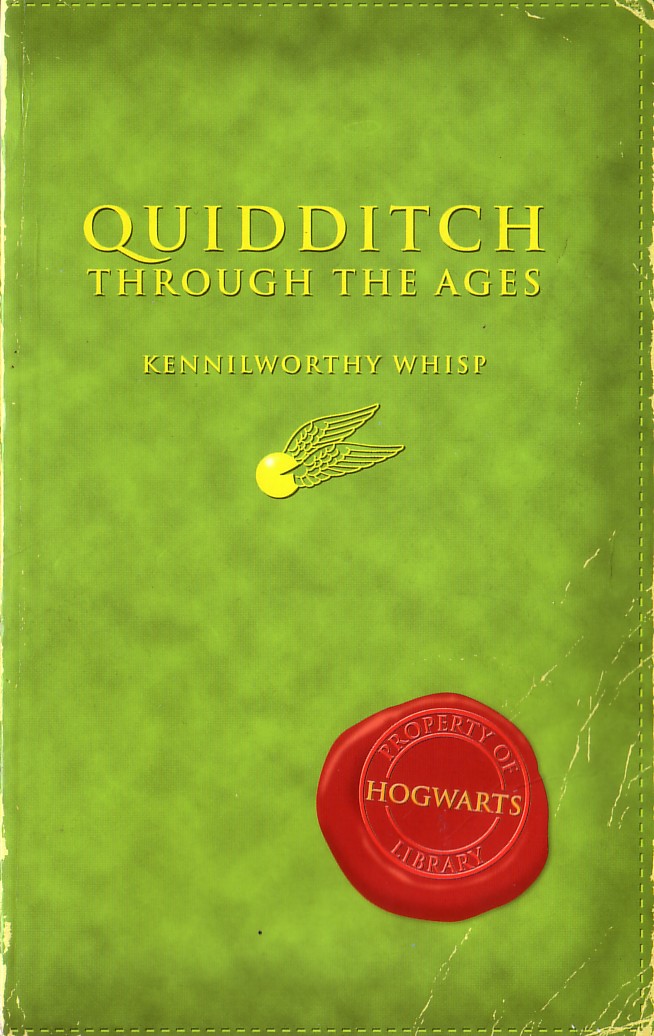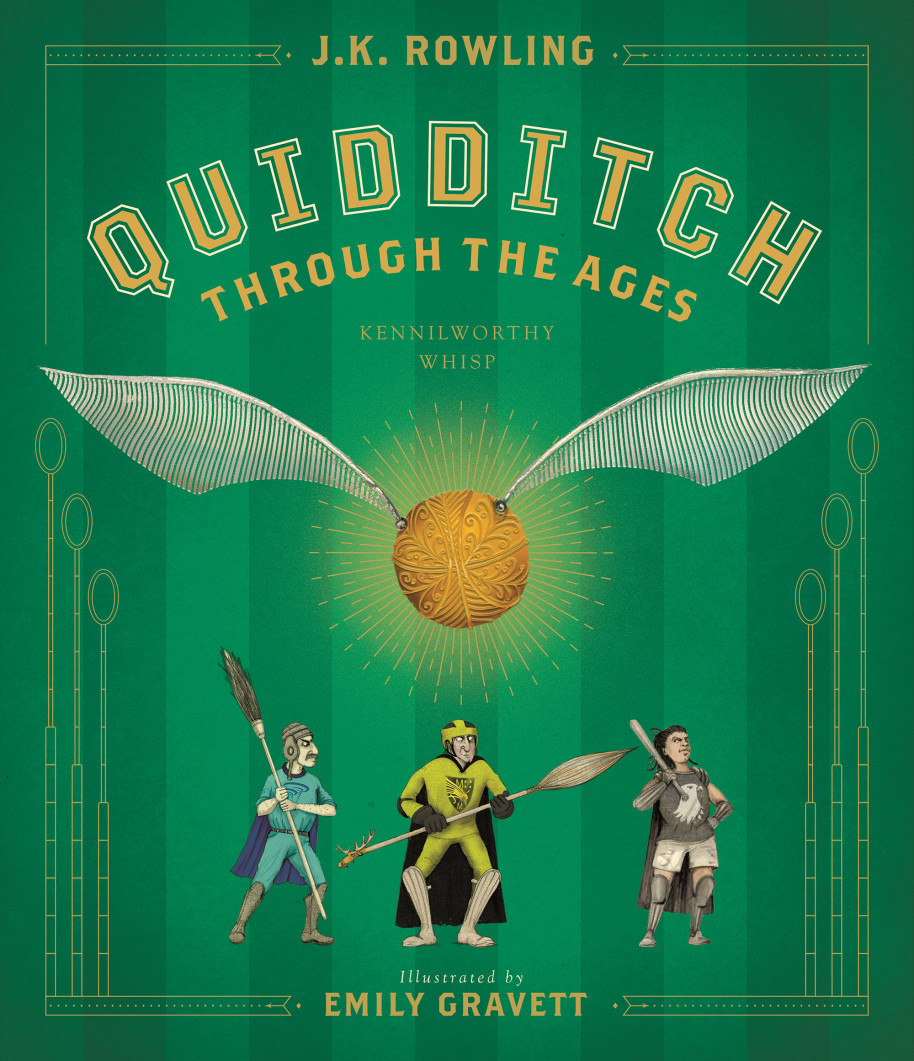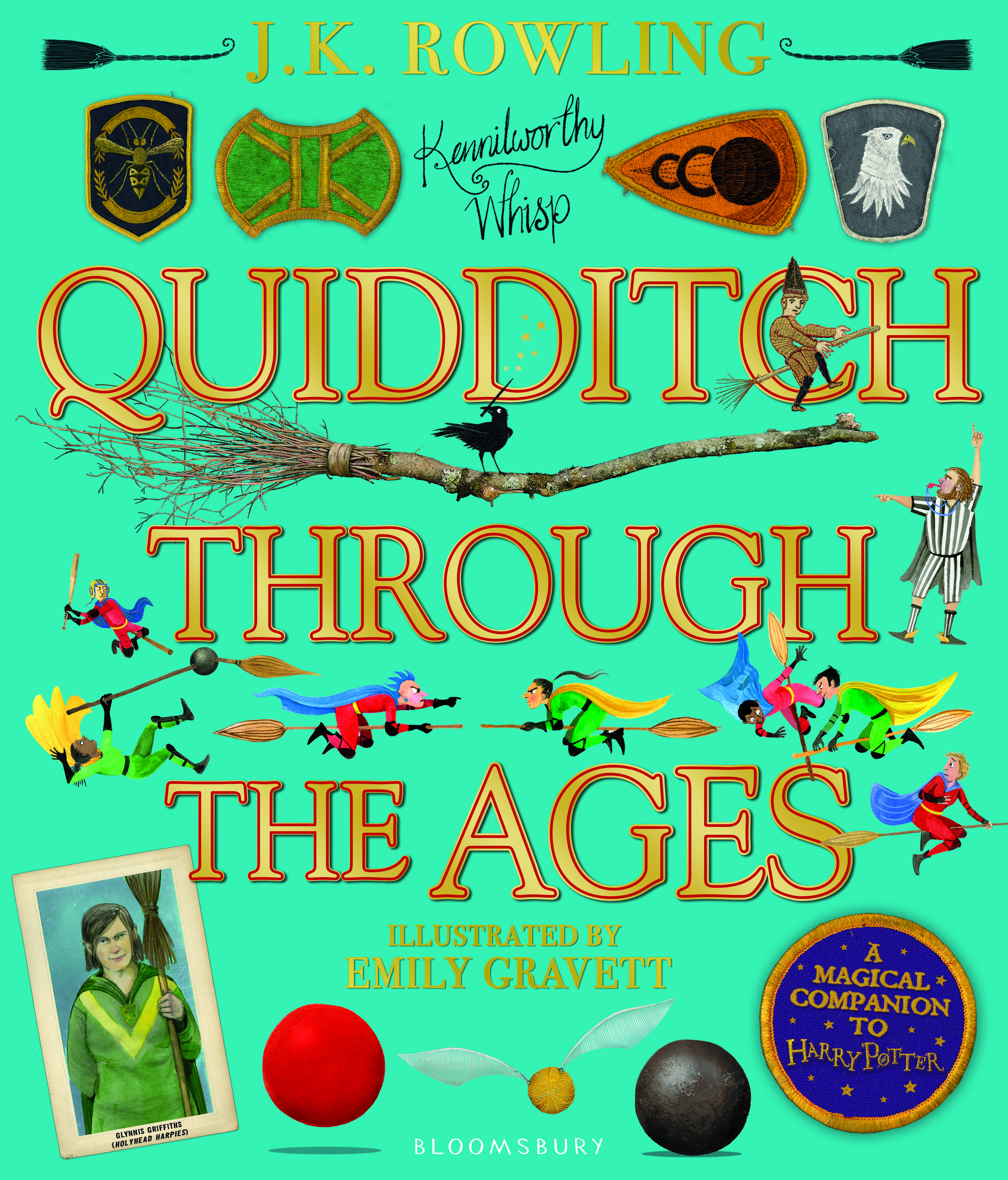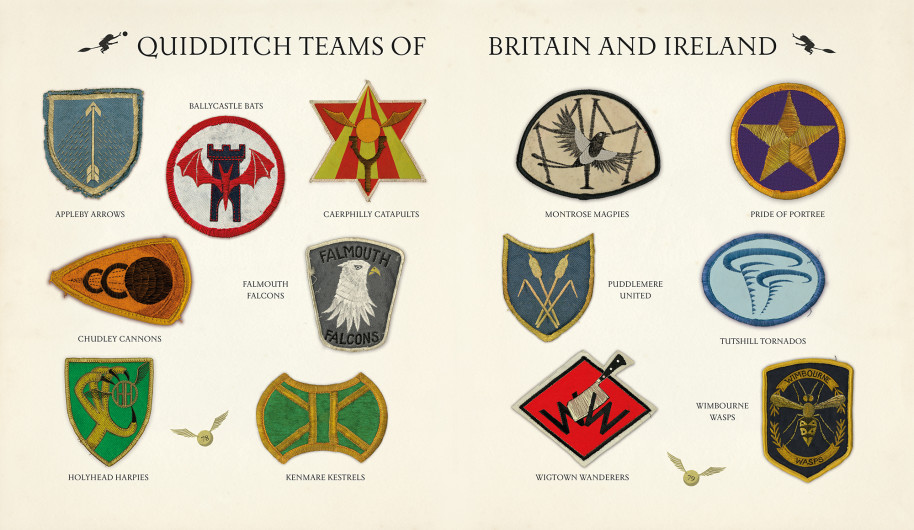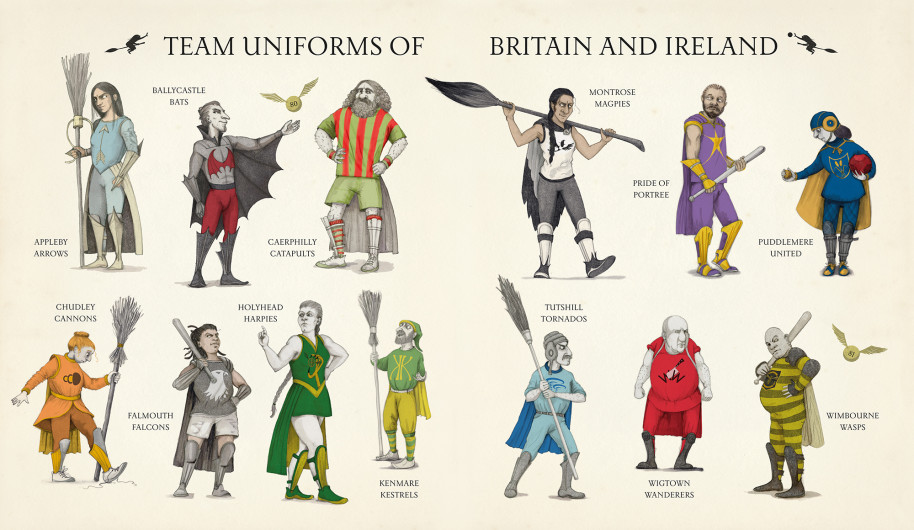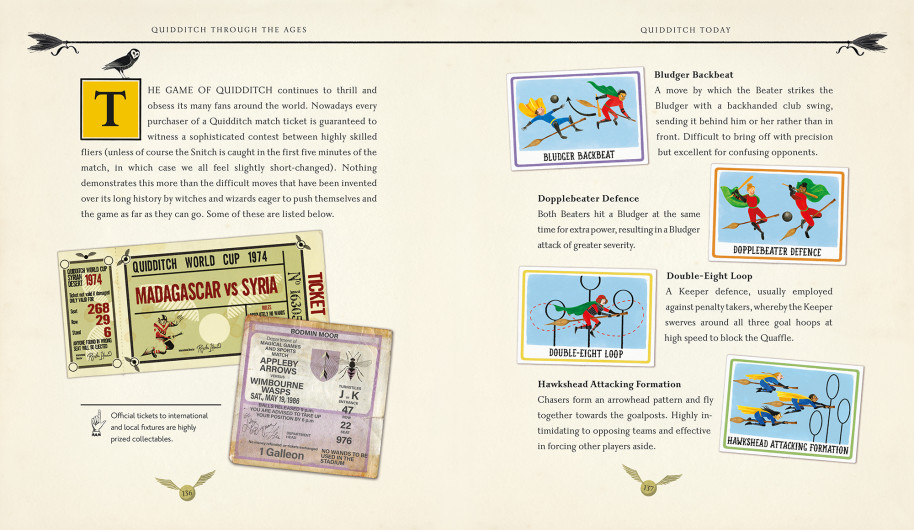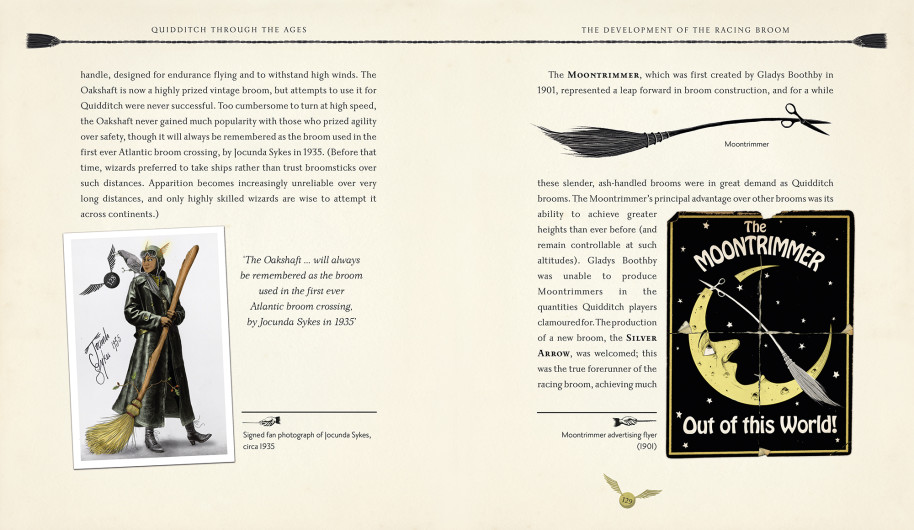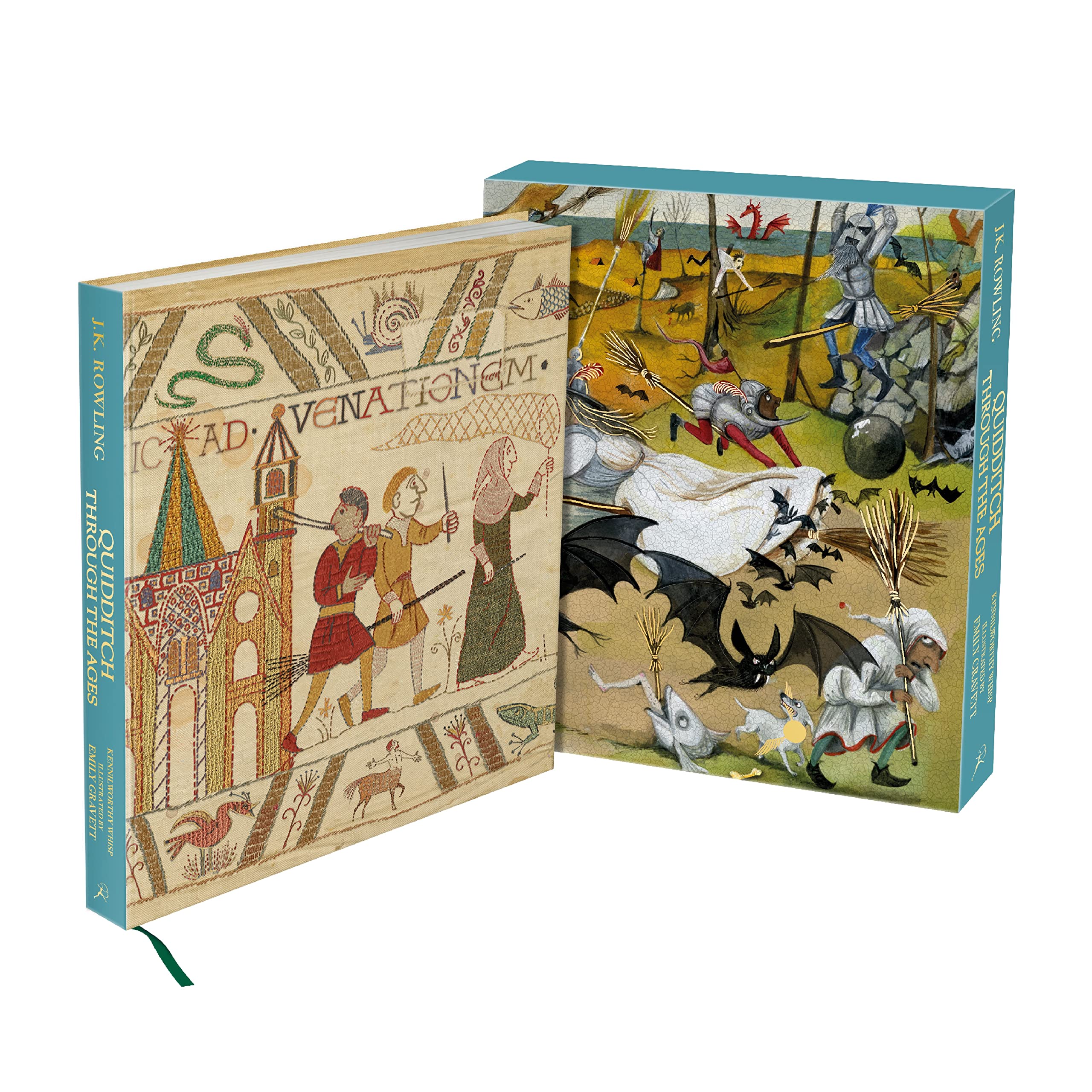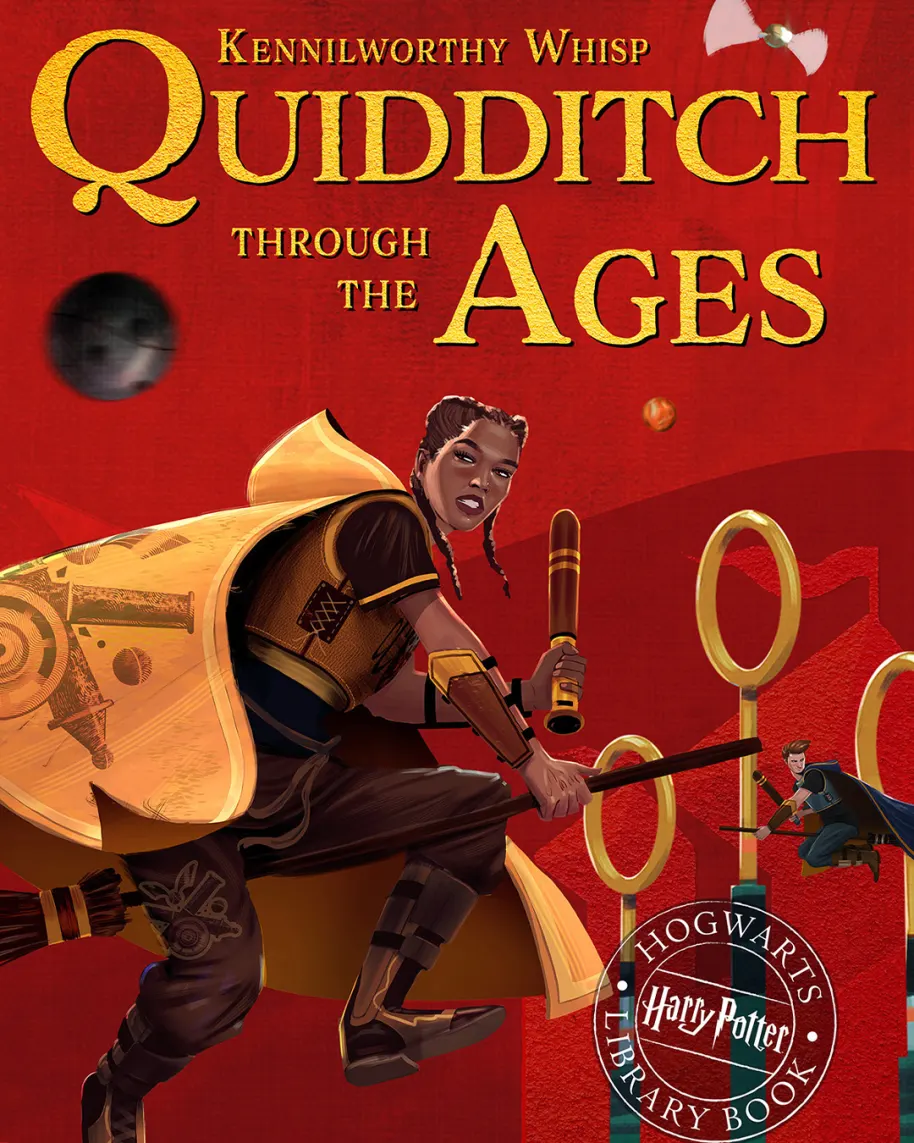Released in March 2001, Quidditch Through the Ages is charmingly reproduced as if it were a copy from the Hogwarts School of Witchcraft and Wizardry library. It starts with the history of broomsticks, describes the evolution of Quidditch through the generations, and includes the rules of the game as well as a chapter on modern-day play. J.K. Rowling’s name does not appear on any covers of the book. Some versions run under the pseudonym “Kennilworthy Whisp,” a Quidditch expert and fanatic who has written many books about the sport. 19% of the suggested retail price of every copy of Quidditch Through the Ages sold goes directly to Comic Relief, which helps young people in various places around the world. According to Comic Relief, sales from this book and its companion, Fantastic Beasts and Where to Find Them, have raised nearly £20 million since 2001.
If you have ever asked yourself where the Golden Snitch came from, how the Bludgers came into existence, or why the Wigtown Wanderers have pictures of meat cleavers on their robes, you need Quidditch Through the Ages. This limited edition is a copy of the volume in Hogwarts School Library, where it is consulted by young Quidditch fans on an almost daily basis.
– Back cover description
Checkout Log (2001)
| Name of borrower | Date due back |
| O. Wood | 9 April |
| B. Dunstan | 16 May |
| M. Flint | 22 June |
| C. Diggory | 3 July |
| A. Johnson | 19 July |
| E. Macmillan | 12 August |
| T. Boot | 21 August |
| S. Fawcett | 16 September |
| K. Bundy | 10 October |
| K. Bell | 19 October |
| C. Warrington | 13 November |
| J. Dorny | 5 December |
| T. Nott | 22 January |
| S. Capper | 31 January |
| M. Bulstrode | 6 February |
| F. Weasley | 15 February |
| H. Granger | 2 March |
| H. Potter | 11 March |
Checkout Log (2009)
| Name | Date due |
| R. Weasley (stinks) | (overdue) 08 JAN |
| N. Longbottom | 18 FEB |
| S. Bones (is gr8) | 04 MAR |
| H. Granger | 14 MAR |
| Padma Patil | 24 MAR |
| E. Macmillan | 29 MAR |
| M. Bulstrode | 13 APR |
| H. Granger | 02 MAY |
| D. Malfoy | 05 MAY |
The Quaffle is the ball with which Chasers score goals and due to the nature of the game, must be caught and thrown one-handed since the players have to control their broomstick simultaneously. The Bludger is a round, jet-black iron ball, 10 inches in diameter, that is hit by a Beater with a bat and attempts to unseat the nearest player, which is why Beaters attempt to knock Bludgers toward opposing players. The Golden Snitch is a very small ball in diameter with golden wings that allow for the ball to fly at a very fast speed, causing it to be extremely difficult to see and catch. The capture of the Snitch ends the game and gives the team whose Seeker caught it 150 points, which usually determines which team wins the game.
Quidditch falls under the jurisdiction of the Department of Magical Games and Sports, part of the Ministry of Magic. The professional organization is called the International Association of Quidditch. Professional matches are attended by trained mediwizards, and while there are many injuries, there are few deaths from Quidditch accidents. However, referees have been known to disappear completely only to turn up weeks later in the middle of the Sahara Desert. There are 700 possible ways to commit a foul in Quidditch, all of which occurred in a World Cup match held in 1473.
The name "Quidditch" comes from Queerditch Marsh, the place where the game originated in the 1000s.
Balls
There are three kinds in all. Four are used in the game.
Quaffle: Large and red, about the size of a soccer ball, used to score goals, worth 10 points.
Bludger: Two in a game, black, slightly smaller than a Quaffle, fly around trying to knock players off brooms.
Snitch: Tiny, the size of a golf ball with wings, very fast and hard to catch, the most important ball in the game.
Players
Seven play at one time for each team.
Chaser: Throws the Quaffle to the other Chasers trying to score goals. Three on each team.
Keeper: Kind of like a soccer goalie. Guards the goalposts. One on each team.
Beater: Uses a baseball-like bat to knock the Bludgers at the other team. Two on each team.
Seeker: Flies around trying to catch the Golden Snitch, scoring 150 points if caught. One on each team.
Other Rules
No time limit.
Each goal scored by Chasers is 10 points.
Penalty shots are given when you get fouled.
Catching the Snitch is 150 points. The game is over when the Snitch is caught.
Rules are of course 'made to be broken.' Seven hundred Quidditch fouls are listed in the Department of Magical Games and Sports records, and all of them are known to have occurred during the final of the first ever World Cup in 1473. The full list of these fouls, however, has never been made available to the wizarding public." (QttA, ch. 6)
| Name | Applies to | Description |
| Blagging | All players | Seizing opponent's broom tail to slow or hinder |
| Blatching | All players | Flying with intent to collide |
| Blurting | All players | Locking broom handles with a view to steering opponent off course |
| Bumphing | Beaters only | Hitting Bludger toward crowd, necessitating a halt of the game as officials rush to protect bystanders. Sometimes used by unscrupulous players to prevent an opposing Chaser scoring |
| Cobbing | All players | Excessive use of elbows toward opponents |
| Flacking | Keeper only | Sticking any portion of anatomy through goal hoop to punch Quaffle out. The Keeper is supposed to block the front rather than the rear |
| Haversacking | Chasers only | Hand still on Quaffle as it goes through goal hoop (Quaffle must be thrown) |
| Quafflepocking | Chasers only | Tampering with Quaffle, e.g., puncturing it so that it falls more quickly or zigzags |
| Snitchnip | All players but Seeker | Any player other than Seeker touching or catching the Golden Snitch |
| Stooging | Chasers only | More than one Chaser entering the scoring area |
- The Bluebottle
- Cleansweep One
- Cleansweep Two
- Cleansweep Three
- Cleansweep Four
- Cleansweep Five
- Cleansweep Six
- Cleansweep Seven
- Comet One-Forty
- Comet One-Eighty
- Comet Two-Sixty
- Firebolt
- Moontrimmer
- Nimbus 1000
- Nimbus 1500
- Nimbus 2000
- Nimbus 2001
- Oakshaft 79
- Shooting Star
- Silver Arrow
- Swiftstick
- Tinderblast
- Twigger 90
Hogwarts Teams
Gryffindor (scarlet)
- Captain: Harry Potter (1996–1997)
- Captain: Angelina Johnson (1995–1996)
- Captain: Oliver Wood (1991–1994)
- Captain: Charlie Weasley (1989–1991)
- Seeker: Ginny Weasley (1995–1997 - Reserve)
- Seeker: Harry Potter (1991–1997)
- Seeker: Charlie Weasley (1985–1991)
- Keeper: Cormac McLaggen: (1996 - 1 Game)
- Keeper: Ronald Weasley (1995–1997)
- Keeper: Oliver Wood (1987–1994)
- Beater: Andrew Kirke (1995–1996)
- Beater: Jack Sloper (1995–1996)
- Beater: Fred Weasley (1990–1995)
- Beater: George Weasley (1990–1995)
- Chaser: Dean Thomas (1996–1997 - Reserve)
- Chaser: Demelza Robbins (1996–1997)
- Chaser: Ginny Weasley (1995–1997)
- Chaser: Katie Bell (1991–1997)
- Chaser: Alicia Spinnet (1991–1996)
- Chaser: Angelina Johnson (1990–1996)
- Chaser: James Potter (1970s)
Hufflepuff (yellow)
- Captain: Zacharias Smith (1995–1996)
- Captain: Cedric Diggory (1993–1994)
- Seeker: Summerby (1995–1996)
- Seeker: Cedric Diggory (1993–1994)
- Keeper: Herbert Fleet (1993–1994)
- Beater: Maxine O'Flaherty (1993–1994)
- Beater: Anthony Rickett (1993–1994)
- Chaser: Cadwallader (1995–1996)
- Chaser: Zacharias Smith (1995–1996)
- Chaser: Tamsin Applebee (1993–1994)
- Chaser: Heidi Macavoy (1993–1994)
- Chaser: Malcolm Preece (1993–1994)
Ravenclaw (blue)
- Captain: Roger Davies (1993–1996)
- Seeker: Cho Chang (1993–1997)
- Keeper: Grant Page (1993–1994)
- Beater: Duncan Inglebee (1993–1994)
- Beater: Jason Samuels (1993–1994)
- Chaser: Bradley (1995–1996)
- Chaser: Chambers (1995–1996)
- Chaser: Roger Davies (1993–1996)
- Chaser: Randolph Burrow (1993–1994)
- Chaser: Jeremy Stretton (1993–1994)
Slytherin (green)
- Captain: Urquhart (1996–1997)
- Captain: Graham Montague (1995–1996)
- Captain: Marcus Flint (1991–1994)
- Seeker: Harper (1996–1997 - Reserve)
- Seeker: Draco Malfoy (1992–1997)
- Seeker: Terence Higgs (1991–1992)
- Keeper: Miles Bletchley (1991–1994)
- Beater: Vincent Crabbe (1995–1998)
- Beater: Gregory Goyle (1995–1998)
- Beater: Lucian Bole (1993–1994)
- Beater: Peregrine Derrick (1993–1994)
- Chaser: Urquhart (1996–1997)
- Chaser: Vaisey (1996–1997)
- Chaser: Blaise Zabini (1996–1997)
- Chaser: Graham Montague (1993–1996)
- Chaser: Cassius Warrington (1993–1996)
- Chaser: Adrian Pucey (1991–1993 and 1995–1996)
- Chaser: Marcus Flint (1991–1994)
Hogwarts Match Schedule
Each year, each House would play the other Houses, resulting in six Quidditch matches throughout the year:
- Gryffindor vs. Slytherin - November (except in Prisoner of Azkaban, when it was moved to the end of the season)
- Hufflepuff vs. Ravenclaw - End of November
- Ravenclaw vs. Slytherin - January
- Gryffindor vs. Hufflepuff - shortly after Valentine's Day (except in Prisoner of Azkaban, when it was moved to November)
- Hufflepuff vs. Slytherin - Early May
- Gryffindor vs. Ravenclaw - End of May, before final exams
British and Irish Quidditch League
England
Appleby Arrows
- Founded in 1612
- Robes: Pale blue emblazoned with silver arrow
- Traditionally fierce rivalry between the Arrows and the Wimbourne Wasps
Chudley Cannons
- Robes: Orange with speeding cannon ball on front and double C's on back
- They have won the League Cup 21 times, the last time in 1892.
- Until 1972, their motto was "We shall conquer." It was then changed to "Let's all just keep our fingers crossed and hope for the best."
- They are Ron Weasley's favorite team.
Falmouth Falcons
- Robes: Dark gray and white with a falcon head on the chest
- They are known for their fierce and violent style of play.
- Their team motto is "Let us win, but if we cannot win, let us break a few heads."
Puddlemere United
- Founded in 1163
- Robes: Navy blue bearing the club emblem of two crossed golden bulrushes
- Their team anthem, "Beat Back Those Bludgers, Boys, and Chuck That Quaffle Here," was recorded by singing sorceress Celestina Warbeck.
- Oliver Wood played for them as reserve Keeper.
- They are Albus Dumbledore's favorite team.
Tutshill Tornados
- Founded in 1520
- Robes: Sky blue with a dark-blue T on front and back
- In 1921, Tornados Seeker Roderick Plumpton caught the Snitch in three-and-a-half seconds, a league record.
- In the early part of the 1900s, the Tornados won the League Cup five times in a row, which is a league record.
Wimbourne Wasps
- Founded in 1312
- Robes: Yellow and black horizontally striped with wasp on chest
- The team has won the League Cup at least 18 times.
- Ludo Bagman played for them as a Beater.
Ireland
Kenmare Kestrels
- Founded in 1291
- Robes: Emerald green with two K's back-to-back on chest
- They are Seamus Finnigan's favorite team.
Northern Ireland
Ballycastle Bats
- Robes: Black with scarlet bat across chest
- Second most successful team in the league, having won the title 27 times
Scotland
Banchory Bangers
- Noted for their poor skills and post-match parties
- The team was disbanded in 1814 after they allowed their Bludgers to go free and illegally tried to capture a Hebridean Black for their mascot, thus disregarding the regulations of the Department of Magical Games and Sports and the International Statute of Secrecy.
Montrose Magpies
- Robes: Black and white with one magpie on the chest and another on the back
- They have won the League Cup 32 times, making them the most successful team in the league.
- They have won the European Cup twice.
- They are Minerva McGonagall's favorite team.
Pride of Portree
- Founded in 1292
- Robes: Deep purple with gold star on chest
- They have won the League Cup at least twice.
Wigtown Wanderers
- Founded in 1422
- Robes: Blood red with a silver meat cleaver on the chest
- The original Wanderers were the seven children of local butcher Walter Parkin.
- Their original Chasers also invented their signature move, known as the Parkin's Pincer.
Wales
Caerphilly Catapults
- Founded in 1402
- Robes: Vertically striped in light green and scarlet
- They have won the League Cup 18 times.
- They won the European Cup in 1956.
Holyhead Harpies
- Founded in 1203
- Robes: Dark green with golden talons on chest
- The only all-female team in the league
- Ginny Weasley pursued her Quidditch career for the Holyhead Harpies.
Regional Teams
The regional teams compete for their regional cups in the regular season.
Africa
Gimbi Giant-Slayers (Ethiopia)
- Two-time winners of All-Africa Cup
Patonga Proudsticks (Uganda)
- Held Montrose Magpies to a draw in 1986
Sumbawanga Sunrays (Tanzania)
- Are well known for their team formation looping among Quidditch fans worldwide
Tchamba Charmers (Togo)
- Masters of reverse pass
The Americas
Fitchburg Finches (United States)
- Won US Cup seven times
Haileybury Hammers (Canada)
Moose Jaw Meteorites (Canada)
- Celebrate victories by flying over the stadium while trailing fiery sparks from their brooms
Stonewall Stormers (Canada)
Sweetwater All-Stars (United States)
- Beat Quafflepunchers in 16-day thriller
Tarapoto Tree-Skimmers (Peru)
Asia
Toyohashi Tengu (Japan)
- Tengu translates into "heavenly dog"
- The most successful Japanese team
- Their practice of burning their broomsticks after a defeat was frowned upon by the International Confederation of Wizards Quidditch Committee as a waste of good wood.
Europe
Bigonville Bombers (Luxembourg)
- Are always among the top goalscorers
Braga Broomfleet (Portugal)
- Invented a new Beater marking system, which made them highly successful
Gorodok Gargoyles (Lithuania)
Grodzisk Goblins (Poland)
- One of the best Seekers ever, Josef Wronski, inventor of the Wronski Feint, played for them.
Heidelberg Harriers (Germany)
- Were called "fiercer than a dragon and twice as clever" by Irish captain Darren O'Hare
- In 1953, they played a seven-day match against the Holyhead Harpies.
Karasjok Kites (Norway)
- They lost the 1956 European Cup final to the Caerphilly Catapults.
Quiberon Quafflepunchers (France)
- Are famous for their flamboyant playing style and their shocking pink robes
Vratsa Vultures (Bulgaria)
- Seven-time European Cup winners
- In 1932, they were defeated by the Appleby Arrows in a match that lasted for 16 days in dense fog and rain.
- They are the pioneers of the long goal.
- Are regarded as one the most thrilling teams to watch
- They are also noted for giving new players the chance to prove themselves.
Oceania
Moutohora Macaws (New Zealand)
- Wear red, yellow, and blue robes
- Are known for their speed and showmanship
- The team mascot is a phoenix named Sparky.
Thundelarra Thunderers (Australia)
- Huge rivalry with Woologong Warriors
- Are from Western Australia, near Perth
Woollongong Warriors (Australia)
- Fierce rivalry with Thundelawa Thunderers
- The Warriors are the inventors of the Woollongong Shimmy.
International Teams
International teams consist of the best players in each country who then compete in international competitions like the Quidditch World Cup. The players may play on different regional teams worldwide, what is important, is their nationality, to be considered for an international team.
The Quidditch World Cup is held every 4 years.
Argentina
- They were known participants in the 1994 Quidditch World Cup.
- In 1877, half of this team was found tied up in the basement of a bar in Cardiff, Wales, after the "Tournament that Nobody Remembers."
Australia
- The Australian Quidditch Robes are green with a golden kangaroo on the front and back.
- Winners of the 1996 Quidditch World Cup
- Team of 1994
- Seeker: Lucy Karoonda
- Keeper: Jonny Nuhaka
- Beater: Kylie Meadows
- Beater: Kelly Whakkaarangapawarau
- Chaser: Matthew Echunga
- Chaser: Kenneth Hastings
- Chaser: Maria Monteith
Brazil
- Team of 2014
- Seeker: Tony Silva
- Keeper: Raul Almeida
- Beater: Carlos Clodoaldo
- Beater: Rafael Santos
- Chaser: Alejandra Alonso
- Chaser: Fernando Diaz
- Chaser: Gonçalo Flores
Bulgaria
- The team made it to the finals in 1994 and 2002 but fell short of winning both times.
- Team of 2014
- Seeker: Viktor Krum
- Keeper: Georgi Zdravko
- Beater: Dimitar Draganov
- Beater: Boris Vulchanov
- Chaser: Stoyanka Grozda
- Chaser: Bogomil Levski
- Chaser: Nikola Vassileva
- Team of 1994
- Seeker: Viktor Krum
- Keeper: Lev Zograf
- Beater: Ivan Volkov
- Beater: Pyotr Vulchanov
- Chaser: Vasily Dimitrov
- Chaser: Clara Ivanova
- Chaser: Alexei Levski
Burkina Faso
- They are the Quidditch World Cup champions of 2006.
- Their Seeker Joshua Sankara became Burkina Faso's Minister of Magic after their win.
Canada
- They are the Quidditch World Cup champions of 1990.
- Their Seeker, Angelus Peel, participated in the 1877 Quidditch World Cup, better known as the "Tournament that Nobody Remembers." He awoke from what is presumed to be either an infection of Cerebrumous Spattergroit or a Mass Memory Charm with his knees backward.
China
- The team made it to the finals in 2010 but fell short to Moldovia.
Egypt
- They are the Quidditch World Cup champions of 2002.
England
- In the 1877 World Cup, dubbed the "Tournament that Nobody Remembers," English Beater Lucas Bargeworthy was missing half his teeth.
- Team of 1994
- Seeker: Blythe Parkin
- Keeper: Denison Frisby
- Beater: Indira Choudry
- Beater: Dawn Withey
- Chaser: Keaton Flitney
- Chaser: Avery Hawksworth
- Chaser: Edric Vosper
Flanders
- The team made it to the finals in 1473 but fell short to Transylvania.
France
- The team is composed primarily of women, and they play in pale blue robes on white brooms.
- The team made it to the finals in 2006 but fell short to Burkina Faso.
- Team of 1994
- Seeker: Cybèle Peltier
- Keeper: Bastien Janvier
- Beater: Alain Lacroix
- Beater: Ninon Saucet
- Chaser: Hildegarde Lafarge
- Chaser: Mathilde Mallard
- Chaser: Josephine Marat
Germany
- They wear purple robes.
- Team of 1994
- Seeker: Konrad Weiss
- Keeper: Hermann Wiel
- Beater: Elena Eldritch
- Beater: Katrina von Glockenspieler
- Chaser: Kursten Blijk
- Chaser: Igor Brand
- Chaser: Kurt Todt
Ireland
- They are the Quidditch World Cup champions of 1994.
- Team of 1994
- Seeker: Aiden Lynch
- Keeper: Barry Ryan
- Beater: Connoly
- Beater: Quigley
- Chaser: Moran
- Chaser: Mullet
- Chaser: Troy
Japan
- They wear white and red robes.
- Every member of the Japanese Quidditch team attributes their prowess to the grueling training they were given at Mahoutokoro, where they practice over a sometimes turbulent sea in stormy conditions, forced to keep an eye out not only for the Bludgers but also for planes from the Muggle airbase on a neighboring island.
- Team of 2014
- Seeker: Noriko Sato
- Keeper: Todoroki
- Beater: Masaki Hongo
- Beater: Shintaro Shingo
- Chaser: Kimiko Kurosawa
- Chaser: Yoshi Wakahisa
- Chaser: Ryuichi Yamaguchi
- Team of 1994
- Seeker: Shizuka Watanabe
- Keeper: Tamotsu Iwamoto
- Beater: Minaka Hirakata
- Beater: Keiko Takahashi
- Chaser: Noriyuki Sato
- Chaser: Yoshihiro Suzuki
- Chaser: Ryotaro Tanaka
Liechtenstein
- The team mascot is a gloomy oversized Augurey named Hans who has his own fan club.
Malawi
- They are the Quidditch World Cup champions of 1998.
Moldovia
- They are the Quidditch World Cup champions of 2010.
Nordic Team
- The Nordic National Quidditch team is the team that sometimes represents Denmark, Norway, and Sweden in international Quidditch tournaments.
- Team of 1994
- Seeker: Tina Lundstrom
- Keeper: Martin Helstrom
- Beater: Asgeir Knutsen
- Beater: Asgard Pettersson
- Chaser: Olaf Andersen
- Chaser: Lorre Gustafson
- Chaser: Peter Hansen
Senegal
- The team made it to the finals in 1998 but fell short to Malawi.
Spain
- They wear robes of yellow with red trimming.
- Team of 1994
- Seeker: Iñigo Fuente Marrero
- Keeper: Sendelina Felino
- Beater: Tiago Montoya
- Beater: Vasco Santini
- Chaser: Chavelle Arbelo Cartaya
- Chaser: Ana de Lebron
- Chaser: Carmen Garcia
USA
- Team of 2014
- Seeker: Darius Smackhammer
- Keeper: Susan Blancheflower
- Beater: Lucas Picquery
- Beater: Pringle
- Chaser: Arsenia Gonzales
- Chaser: Quentin Kowalski
- Chaser: Mercy Wardwell
- Team of 1994
- Seeker: Ariel Singleton
- Keeper: Ralph Heidelberger
- Beater: Troy Duvall
- Beater: Greg Ruczinski
- Chaser: Gianni Fedele
- Chaser: Robert Green
- Chaser: Debbie Muntz
Beater Moves
Bludger Backbeat
- A move by which the Beater strikes the Bludger with a backhanded club swing, sending it behind him or her, rather than in front. Difficult to bring off with precision but excellent for confusing opponents.
Dopplebeater Defense
- Both Beaters hit a Bludger at the same time for extra power, resulting in a Bludger attack of greater severity.
Chaser Moves
Hawkshead Attacking Formation
- Chasers form an arrowhead pattern and fly together toward the goalposts. Highly intimidating to opposing teams and effective in forcing the other players aside.
Parkin's Pincer
- So named for the original members of the Wigtown Wanderers, who are reputed to have invented this move. Two Chasers close in on an opposing Chaser on either side while the third flies headlong toward the opposing Chaser.
Porskoff Ploy
- The Chaser carries the Quaffle upward, leading opposing Chasers to believe that he or she is trying to escape them to score, but then throws the Quaffle downward to a fellow Chaser waiting to catch it. Named after the Russian Chaser Petrova Porskoff.
Reverse Pass
- A Chaser throws the Quaffle over one shoulder to a team member. Accuracy is difficult.
Woollongong Shimmy
- Perfected by the Australian Woollongong Warriors, this is a high-speed zigzagging movement intended to off opposing Chasers.
Keeper Moves
Double Eight Loop
- A Keeper defense, usually employed against penalty takers, whereby the Keeper swerves around all three goal hoops at high speed to block the Quaffle.
Starfish and Stick
- The Keeper holds the broom horizontally with one hand and one foot curled around the handle while keeping all limbs outstretched.
Seeker Moves
Plumpton Pass
- A seemingly careless swerve that scoops the Snitch up one's sleeve. Named after Roderick Plumpton, Tutshill Tornado Seeker, who employed the move in his record-breaking Snitch catch of 1921. Although many critics have alleged that this was an accident, Plumpton maintained until his death that he had meant to do it.
Wronski Feint
- The Seeker hurtles toward the ground pretending to have seen the Snitch far below but pulls out of the dive just before hitting the pitch. Intended to make the opposing Seeker copy him and crash. Named after the Polish Seeker Josef Wronski.
Miscellaneous Moves
Sloth Grip Roll
- Hanging upside down off the broom, gripping tightly with hands and feet to avoid a Bludger.
Transylvanian Tackle
- First seen at the World Cup of 1473, this is a fake punch aimed at the nose. As long as contact is not made, the move is not illegal, though it is difficult to pull off when both parties are on speeding broomsticks.
The illustrated edition of Quidditch Through the Ages was released on October 6, 2020, by Bloomsbury and Scholastic. Each page features color illustrations by artist Emily Gravett. The cover of the Scholastic edition features a giant Snitch and a few small Quidditch players on a green background, while the cover of the Bloomsbury edition features brightly uniformed Quidditch players and equipment on a blue background.
Deluxe Illustrated Edition
Released on October 6, 2020, by Bloomsbury, the deluxe illustrated edition of Quidditch Through the Ages features artwork by Emily Gravett. This edition also includes special features such as handcrafted memorabilia, two pull-out double gatefold spreads, and an art print of the Sumbawanga Sunrays performing formation looping.
On January 26, 2018, it was revealed that The Walking Dead actor Andrew Lincoln would be narrating the audiobook version of Quidditch Through the Ages. With a running time of 3 hours and 10 minutes, this audiobook features bonus material for fans and is produced with immersive sound design techniques by Pinewood Studios' award-winning sound designers. It was first released on March 15, 2018, and in traditional audio CD format on June 14 of the same year. The behind-the-scenes video below shows an exclusive Pottermore interview with Andrew Lincoln.

